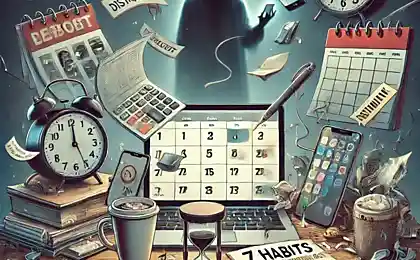165
How to Get Rid of Time Eaters: 11 Radical Actions

Introduction. If you feel like you’re barely getting half done in a week, if every night it seems like your day is wasted and your important tasks are still on the “tomorrow” list, it’s time to think about who (or what) is “stealing” your time. Time eaters are not just distractions; they are a whole system of habits, activities, rituals that prevent us from being productive and achieving our goals on time. The digital age, with all its gadgets and social media, has only exacerbated the problem – and the more complex our environment becomes, the more reason to put important things off the table.
But it's not all that sad. There is a set of quite radical actions that help to “win back” your time and direct it to where it is really needed. Below we will look at 11 such actions – some of them will require you to make serious decisions, others seem obvious, but for some reason are rarely implemented in practice. Approach the list meaningfully, choose something that will really get rid of time eaters in your particular situation.
1. 'Kill' merciless notifications
The ubiquitous notifications are one of the most important “cannibals” of our time. Even a short audible alert from the phone is confusing and provokes a chain reaction: we check SMS, then flip through the feed of social networks, and now 10-15 minutes have disappeared.
- Radical action: Turn off all audio notifications on your smartphone (except for the really critical ones: bank transactions, messages from loved ones).
- Effect: You will reduce the number of spontaneous “failures” in the social network and will be able to stay in the “flow” much longer.
2. Limit social networks to a rigid framework
Social media has become the gold mine of procrastination. “I’ll look into the tape for a second” turns into an hour of leafing through memes. To get this process under control, you need to set a clear time frame.
- Radical action: Use smartphone screen settings or special applications that block social networks after a certain limit per day (for example, 30 minutes).
- Effect: You will get rid of the constant temptation to “quickly” check what is new, and save a lot of time for a real job or vacation without screen noise.
3. Create a to-do blacklist
We are used to a to-do list where we list everything we need to accomplish in a day. But just as important is the blacklist, the list of activities that waste your time. It could be an all-night series, endless phone conversations about nothing, looking at bloggers’ advice on a topic you’re already an expert on.
- Radical action: Separately write down what activities bring you the minimum benefit and do not lead to goals. Try to avoid them or do them infrequently, in "reward mode" rather than habit.
- Effect: You realize that some of the “right” things can actually be cut out of your life.
4. Conduct a “digital cleansing” of gadgets
A lot of apps, tabs, bookmarks, saved articles and other digital objects create the feeling that you need to “get everything done”, “check everything”, “read everything”. But most of the time, the lion’s share of it will never be used.
- Radical action: Remove any apps you don’t use regularly. Clear the Downloads folder, get rid of garbage on the desktop of your computer and smartphone.
- Effect: Feeling “unloaded”; you’ll have less temptation to be distracted and be able to find the things you really need faster.

5. Delegate what you hate to do
Unloved tasks can take a lot of time due to resistance and constant procrastination. In the end, we do not do them with joy, and do not have time for more significant things.
- Radical action: Find a way to transfer such tasks to other people (colleagues, assistants, freelancers), if possible.
- Effect: You will free up cognitive resources that will no longer go to thinking about future suffering. This, in turn, will increase efficiency in key matters.
6. Implement the Pomodoro method rigidly
Many people have heard of the Pomodoro technique (25 minutes of work, 5 minutes of break), but few people follow it in a truly disciplined way. Meanwhile, this is one of the most effective ways to manage tasks without losing concentration.
- Radical action: Set a timer for 25 minutes and do not allow yourself to be distracted for a second. At the end of the session - a mandatory short rest (5 minutes).
- Effect: The brain clearly understands the “work block” and “pause,” so productivity increases and procrastination decreases.
7. Give up a lot of (over)tasks
The idea of doing multiple things at once seems appealing, but in fact, according to the American Psychological Association (APA), multitasking reduces efficiency and leads to more errors. Focusing on one task allows you to perform it faster and better.
- Radical action: Plan your workday on a “one task at a time” basis. Finish one before you start the other.
- Effect: You will notice that you are doing things faster and with less stress.
8. No to pointless meetings and calls
Calling just in case meetings or endless phone calls about obvious things are classic time eaters in a corporate environment. If you can achieve results by sending an email or a short message, why spend half an hour (or more) on conversations that are of little use?
- Radical action: Learn to say no to invitations to meetings that are not about your immediate tasks. Offer alternatives: “Please send me a report” or “Let’s do a little chat instead of a meeting.”
- Effect: You're going to keep the integrity of your working hours and you're going to save yourself from speaking without any added value.
9. Plan your leisure as tightly as your work.
It seems counterintuitive to schedule a trip to the movies or read a book, but the lack of planning in the field of recreation leads to the fact that we spend free time in front of the TV or on social networks, without getting a full recovery.
- Radical action: include rest in your calendar - plan a " bachelorette party", an evening of board games, a walk in the park. Take these plans as seriously as you do your work.
- Effect: You will begin to rest better, which means you will increase your overall productivity and avoid feeling “didn’t have anything” even on weekends.

10. Set a “digital mode” before going to bed
A huge amount of time is spent scrolling through the news feed in bed before going to bed. From the point of view of physiology, blue screen light impairs the production of melatonin, because of which sleep becomes superficial and inferior.
- Radical action: Avoid using a smartphone, tablet or laptop at least an hour before bedtime. If necessary, install parental controls or a blocker.
- Effect: Better sleep quality and more energy the next day, less temptation to get stuck on the internet at night.
11. Analyze the day and do a time audit.
Even the most drastic measures may not work if you don’t understand where your day is actually going. A “time audit” is a method where you record all your actions within a few days or a week with an accuracy of 15-30 minutes, and then analyze what the clock takes.
- Radical action: keep a detailed time diary - you can in a notebook or a special application. At the end of the period, count how many hours were spent on the really important things and how many hours were spent on the “routine eaters.”
- Effect: Full control of your employment. You will get an objective picture that will help you decide which tasks can be optimized or crossed out.
Conclusion
When it comes to time, any “trifle” can cost us a whole lot of energy and nerves. Time eaters are not necessarily large-scale projects; sometimes they are the accumulation of micro-distractions, banal “gatherings” on social networks, unnecessary phone calls or evenings spent at the screen without a special purpose. The key is awareness and willingness to act radically. Turning off notifications, removing unnecessary apps, implementing clear rules for using social networks and calendars, learning to say no to meaningless meetings and conversations all seem elementary, but collectively they can return us tens of hours a week.
Each of us has the right to decide how to allocate this irreplaceable resource. But if there are global goals and ambitions, and time is always short, it is necessary to reconsider your habits. Ultimately, “time is money” is not an empty slogan, but a real formula by which we pay for our best days and years of unrealized dreams. The sooner you free yourself from time eaters, the closer your true priorities and values will become.
How Smart People Talk to People They Don't Like: 8 Wise Principles
How to find your favorite business and enjoy life: 3 questions























